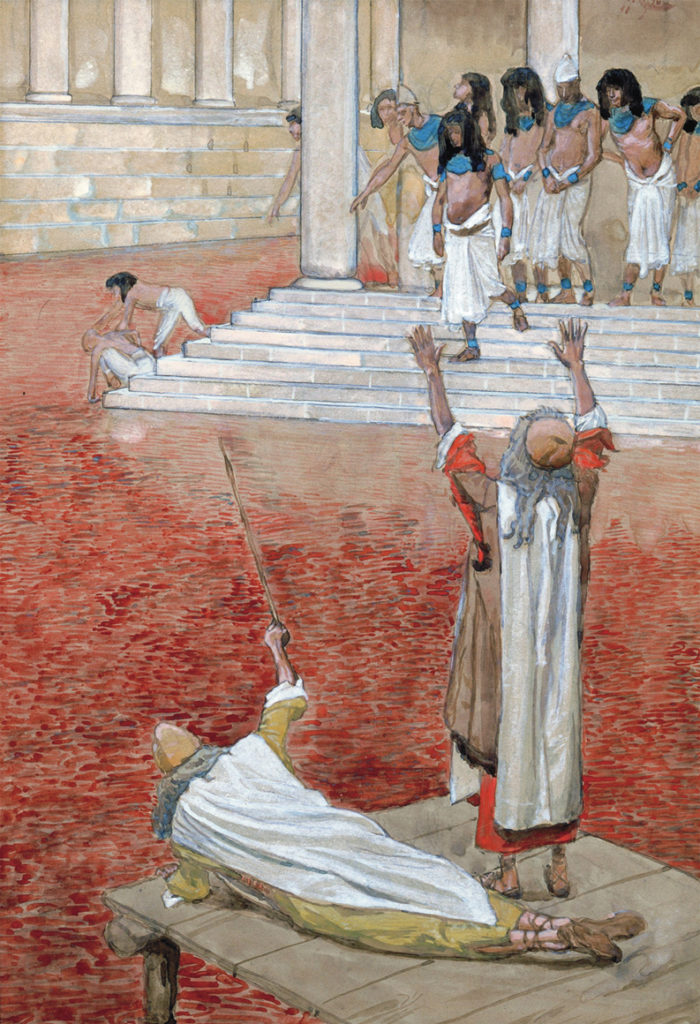Biblical Plagues Offer Insight in the Wake of COVID-19
The Rev. John A.H. Tomoso†
In the Book of Exodus, there are ten plagues (disasters) that are chronicled. These are ten disasters inflicted on Egypt by Yahweh, the God of Israel. Exodus tells the greatest story of Israel’s history, when Abraham’s descendants escaped from cruel slavery in Egypt. You can read it for yourself and you will find Exodus divided into two parts; the first part, Exodus 1 through 18, is about The Great Escape and the second part, Exodus 19 through 40, is about The Great Covenant.
So, the Plagues of Egypt, in Hebrew מכות מצרים (Makot Mitzrayim), were inflicted on the people because Pharaoh, the Egyptian King, refused to let the Israelites (God’s People) leave Egypt. These plagues (disasters), were seen by the Israelites as signs and marvels given by Yahweh (God) as answers, by God, to Pharaoh’s refusal, so that the Egyptians might know that Yahweh is the Lord.

What were these Plagues? First there was water turning into blood (Exodus 7:14–24) with the River Nile changed into blood. The Egyptians were not able to drink its water. Then there were Frogs (Exodus 7:25–8:15) with the Lord saying, “Let my people go, so that they may worship me.” The Nile, indeed all of Egypt, teemed with frogs. Oh, then how about the gnats or lice (Ex. 8:16–19) which infected both people and animals with all the dust throughout Egypt becoming lice. (Ah, don’t start scratching yourself!) The fourth plague was of creatures capable of harming people and livestock (Ex. 8:20–32), in Hebrew עָרוֹב (‘arob), as in mixture or swarm. Here Pharaoh asked Moses to remove this plague, promising to grant the Israelites their freedom. You know the rest of this part of the story. Pharaoh refused to keep his promise! So, the fifth plague came; Pestilence of livestock (Exodus 9:1–7), with Yahweh saying that if Pharaoh again refuses to let the Israelites go, “the hand of the Lord will bring a terrible plague on your livestock in the field, on your horses, donkeys, and camels, on your cattle, sheep and goats.” Obviously, all four-legged animals dropped dead and Egypt went hungry. With nothing happening from the Palace of Pharaoh, Yahweh commanded Moses to take handfuls of soot from a furnace and “toss it into the air in the presence of Pharaoh (Exodus 9:8–12). Festering boils then broke out on men and animals throughout Egypt.
You know what didn’t happen.
Yahweh again said, “Let my people go” and let Pharaoh know that if he again refused, He would send the full force of his power and might “against you and against your officials and your people … so that you may know that there is no one like me in all the earth.” (Exodus 9:13–35) Pharaoh was warned that if he did not let the Israelites go, Yahweh would send the worst hailstorm that had ever fallen on Egypt. Exodus chronicles that it was the worst storm, with thunderstorms and lightening, that the Egyptians ever suffered, with many deaths of people and animals. What happened yet is the plague that has always fascinated me since the first time I heard about it. Locusts came and voraciously devoured everything, leaving little left for the people! (Exodus 10: 1–20). Exodus chronicles that this was something “neither your fathers nor your forefathers had ever seen.” Yahweh asked Pharaoh, “How long will you refuse to humble yourself before me? Next came darkness for three days.” (Exodus 10: 21–29). Yahweh wanted darkness to “spread over Egypt” so that darkness “can be felt.” It was like a “stay-at-home” quarantine for all of Egypt, as all really felt dark, alone and utterly helpless and afraid!
Now, what happened next, with the Israelites still enslaved in Egypt, was truly gruesome and awful. Yahweh said He would go throughout Egypt, and have every firstborn son in Egypt die, including the firstborn son of Pharaoh (Exodus 11:1–12:36). Exodus chronicles that there was much loud wailing such as never was heard in Egypt, even at the Palace of the Pharaoh. (Remember, that before this final plague, Yahweh commands Moses to tell the Israelites to mark a lamb’s blood above their doors in order that Yahweh will pass over them, meaning that their firstborn would not be touched by death, as He passed over them. If this sounds familiar to you, as faithful Christians, think about how Christ instituted the Eucharist (Mass) at a Passover Meal (Sedar) he was attending before he was crucified. Needless to say, bereft of all sense of power and subjugation, Pharaoh orders the Israelites to leave and to take whatever they want. He even asks Moses to bless him in the name of the Lord!
What does this story of the Plagues of Egypt mean for us, in this time of COVID-19 and quarantine and great economic upheaval? Well, I think that if we look to Part Two of Exodus, Chapters 19 through 40, which chronicles The Great Covenant of God with His People, we know that Yahweh gives us all we need to live through this plague, this disaster, if we believe and observe what He has given us, His Faithful People. I think that this time of COVID-19 and quarantine and great economic upheaval, gives us pause to reflect on our relationship with God and with one another. “The Great Covenant” gives us clues for our daily living, right here, right now!
 Rev. John A. Hau’oli Tomoso† is a Social Worker and Episcopal Priest. He is a Priest Associate at Good Shepherd Episcopal Church in Wailuku and an on-call Chaplain at Maui Memorial Medical Center. Tomoso was graduated from St. Anthony Jr./Sr. High School, the College of St. Thomas in St. Paul, Minnesota (Bachelor of Arts in Political Science and Sociology) and Myron B. Thompson School of Social Work at the University of Hawai’i at Mānoa (Masters of Social Work). In 2008, he retired from the civil service as the Maui County Executive on Aging. In March 2019, Tomoso retired as the Executive Director of the non-profit Tri-Isle Resource Conservation and Development Council, Inc., after a social work career that spanned 43 years of practice. His wife Susan recently retired as a 7th grade Language Arts Teacher at Maui Waena Intermediate School.
Rev. John A. Hau’oli Tomoso† is a Social Worker and Episcopal Priest. He is a Priest Associate at Good Shepherd Episcopal Church in Wailuku and an on-call Chaplain at Maui Memorial Medical Center. Tomoso was graduated from St. Anthony Jr./Sr. High School, the College of St. Thomas in St. Paul, Minnesota (Bachelor of Arts in Political Science and Sociology) and Myron B. Thompson School of Social Work at the University of Hawai’i at Mānoa (Masters of Social Work). In 2008, he retired from the civil service as the Maui County Executive on Aging. In March 2019, Tomoso retired as the Executive Director of the non-profit Tri-Isle Resource Conservation and Development Council, Inc., after a social work career that spanned 43 years of practice. His wife Susan recently retired as a 7th grade Language Arts Teacher at Maui Waena Intermediate School.
